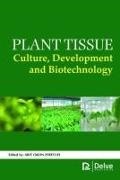Share
Fr. 226.80
Arit Okon Efretuei
Plant Tissue Culture, Development and Biotechnology
English · Hardback
Shipping usually takes at least 4 weeks (title will be specially ordered)
Description
The constant acquisition of energy is what determines all life on earth. The sun generates almost all renewable energy through radiation. In turn, radiant energy ends up heating the earth where it causes convection and contributes immensely to weather patterns. Through the atmosphere, the weather patterns transfer water from lakes and oceans to the land surface and back. This forms the fundamental environment needed to support life. However, life requires chemical energy to thrive, and a greater percentage of this energy is derived from sunlight.Plants containing chlorophyll participate in energy capture, and use photons to move the cleavage water into hydrogen and oxygen. In photosynthesis, carbon dioxide (part of it created from the respiration of animals, plants, bacteria and fungi) is finally recycled by its change into water, sugar and oxygen. Sugar's chemical energy then helps to drive the rest of metabolic reactions required to sustain life. Therefore, the carbon in sugar is used in the production of more complex carbohydrates in addition to proteins and other molecules that consists the cells, organs and tissues of plants. In turn, the nutritive components and chemical energy found in plants become the main source of energy for animals. It is this basic ability of green plants to survive and reproduce by acquiring and using energy from the sun that has resulted in the huge diversity of earth's life.The evolutionary power of natural selection that perpetually drives the diversification of animals and plants is well known. Nevertheless, humankind has changed the course of natural selection by preferring certain sources of food to others, thus encouraging and selecting those that seem superior in one way or the other. The selection of improved 'varieties' begun in an unintentional manner but over the millennia, it became more organized. Ultimately, selective breeding in plants (and also animals) came into the scene, forming the cornerstone of contemporary agricultural development.Agricultural development then became the backbone of modern civilization, letting humans switch from a subsistence lifestyle to one that encourages pursuit of activities that no one had imagined earlier on. And relevant to these "unimaginable activities" is the start, development, and pursuit of plant science. The human endeavour is responsible for the development of plants into diverse, useful products. Today, it is possible to develop improved plants using previously unrecognized methods. Breeding programs continue to undergo revolution with biotechnology, and the result is plants with properties never imagined before. Along with this rapid change, there comes controversy - optimism, new discussions, opportunities, and fear of the unknown.
About the author
Arit Efretuei obtained her PhD in Agriculture from the University of Reading, UK in 2015. Her interests are in crop nutrient uptake, soil nutrient management and mitigation of soil nutrient losses to the environment. She is presently working as a freelance agronomic writer.
Summary
The human endeavour is responsible for the development of plants into diverse, useful products. Today, it is possible to develop improved plants using previously unrecognised methods. Breeding programs continue to revolutionise biotechnology. This book offers an introduction to this subject.
Product details
| Assisted by | Arit Okon Efretuei (Editor) |
| Publisher | Delve Publishing |
| Languages | English |
| Product format | Hardback |
| Released | 28.02.2018 |
| EAN | 9781773612560 |
| ISBN | 978-1-77361-256-0 |
| No. of pages | 282 |
| Subject |
Natural sciences, medicine, IT, technology
> Technology
> General, dictionaries
|
Customer reviews
No reviews have been written for this item yet. Write the first review and be helpful to other users when they decide on a purchase.
Write a review
Thumbs up or thumbs down? Write your own review.

